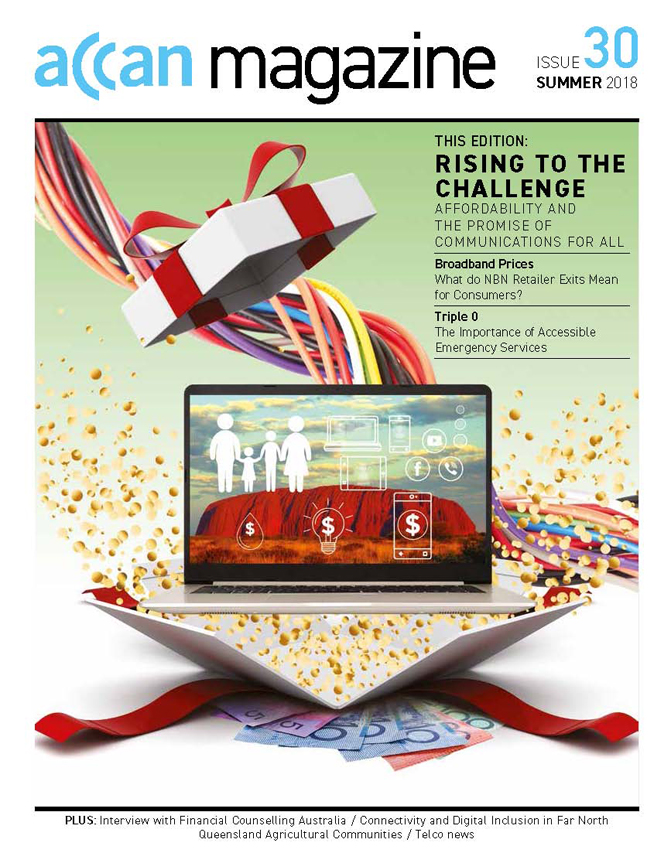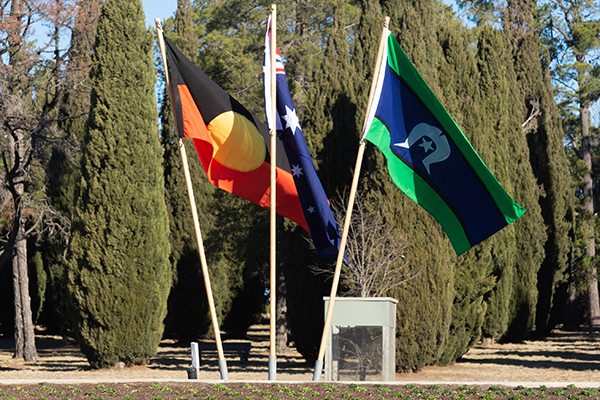Key Dates
Next Grant Round:
Applications for funding will open early 2025.
> Information about our Grants Program
Independent Grants Panel:
Results of the recent EOI will be notified Dec 2024.
> Information about our Panel
We can help: grants@accan.org.au
or phone 02 9288 4000
Subscribe to Grants Program mailings
 Do you sometimes act as a ‘proxy internet user’ – where you use online services and applications on behalf of someone else who otherwise makes limited use of the internet? Proxy internet assistance often takes place within families – notably elderly parents being helped by their adult children. Other proxy users include people acting in a professional capacity – for example carers, social workers and other public-facing professionals who assist clients with specific online tasks.
Do you sometimes act as a ‘proxy internet user’ – where you use online services and applications on behalf of someone else who otherwise makes limited use of the internet? Proxy internet assistance often takes place within families – notably elderly parents being helped by their adult children. Other proxy users include people acting in a professional capacity – for example carers, social workers and other public-facing professionals who assist clients with specific online tasks.
Read more: Using the internet on behalf of others
Write comment (0 Comments)
There are a number of companies that have their own ADSL equipment. If one provider has no availability, another might. Here are some companies that have their own ADSL equipment:
There may also be other fixed line networks that operate in your area that you may be able to use, such as:
- iiNet VDSL2 (ACT)
- Optus Cable (Sydney, Melbourne, Brisbane)
- Telstra (Velocity, South Brisbane, Cable)
- Wondercom FTTB
If you are in a new development you may have access to other networks. You can check the new developments map to see if you are covered.
Check nbn to see when you will be connected to the National Broadband Network.

Conference background
In 2018, technology and digital services are all around us. Consumers use the internet and telecommunications services to stay connected, go shopping, link into education and job opportunities and access government services.
While we increasingly live our lives online, it’s vital that we don’t leave anyone behind.
- What gaps will appear in the connected world?
- Who will and won’t be able to access services due to limitations on connectivity?
- What can we do to ensure that people are not only connected but also have the confidence to use new technologies to their benefit?
We will explore these questions and more at the 2018 ACCANect Conference, themed: ‘Confidence in the Connected World’.
ACCANect will be an opportunity for consumers, providers and government representatives to get up to speed on consumer concerns around the connected world.
Our policy priorities are broad subject areas which identify the focus of our policy work for 2018-19. ACCAN's mission is to represent consumers and the public interest, with particular emphasis on the needs of consumers for whom the market is not working.
Our policy priorities were developed in close consultation with ACCAN members, and informed by our knowledge and analysis of the communications market and market trends.
Download: ![]() ACCAN Magazine - Issue 30 Summer 2018.pdf1.23 MB (Note: reading order not accessible)
ACCAN Magazine - Issue 30 Summer 2018.pdf1.23 MB (Note: reading order not accessible)
Download accessible version: ![]() ACCAN Magazine Issue 30 Summer 2018 - accessible version.docx37.21 KB
ACCAN Magazine Issue 30 Summer 2018 - accessible version.docx37.21 KB

The National Broadband Network (NBN) is Australia’s wholesale internet provider. This means that when you sign up for an NBN plan, you must order the service through a telco (e.g. Telstra, Optus, TPG).
Read more: Choosing a Small Business NBN Internet Plan
Write comment (0 Comments)Johanna Plante joined the ACCAN Board in 2010 and was then elected as Chairperson in 2011, a role she would hold for 6 years. Johanna’s term on the ACCAN Board finished in 2017 after the organisation had successfully been reviewed. During her time as Chair, ACCAN’s profile grew and industry engagement increased. Johanna has worked tirelessly to improve outcomes for consumers with disabilities particularly for Deaf and Hard of Hearing consumers. She was recently on the Minister appointed Regional Telecommunications Independent Review Committee and she worked hard to ensure the voices of rural, regional and remote consumers were heard.
ACCAN commissioned research assessing the effectiveness of programs and offers being provided by the telecommunications industry to assist low income households and individuals with the affordability of their telecommunications services.
The research encompassed surveys and interviews with community organisations involved in delivering some of the programs, community organisations who work with low income individuals and households, and low income individuals themselves – both those that have received programs and offers from telcos and those that haven’t.
Read more: Addressing Telecommunications Affordability: Evaluating Support for Low Income Consumers

ACCAN values disability access. We want to be a model in this field, for other not-for-profits, industry and government. ACCAN has registered our 2022-2024 Disability Inclusion Action Plan with the Australian Human Rights Commission’s Register of Disability Discrimination Act Action Plans.
Through enacting our Disability Inclusion Action Plan, ACCAN aims to:
ACCAN’s purpose, as outlined in our Strategic Plan, is to work for “communications services that are trusted, inclusive, accessible and available for all.”
In 2022-23 ACCAN will focus on the following priority areas, informed by the ongoing impacts of COVID-19 and natural disasters on consumers’ use of communications services and the need for accessible and easy-to-understand consumer education and information about communications issues. At the same time, we will be responsive to emerging issues, and engage with government and industry consultations in areas of significance for communications consumers, including the converging areas of media, broadcasting and digital platforms.
Our policy priorities are developed in close consultation with ACCAN members and are informed by our knowledge and analysis of the communications market.
![]()
Desktop computers - Western Australia
Center For Accessibility Australia
This project was funded by ACCAN to explore the issues raised with CFA Australia by people with disability regarding the difficulty in cancelling mobile phone plans. To identify potential issues in cancelling plans provided by SIM providers, a comprehensive assessment was taken of 44 SIM providers in relation to user testing and conformance against the WCAG 2.2 standard.
The results identified that there are currently (at the time of publication) no telco apps or websites that completely support people who are blind or have low vision, and a very low number of apps that can completely support people that are deaf or hard of hearing in cancelling their plans. All apps or websites had some form of accessibility support for people that have a cognitive disability, but none of the apps were entirely accessible across the board. People who are blind or have low vision face an additional challenge in that there were accessibly issues with both using their preferred assistive technologies such as screen readers, and accessibility issues with the app or website itself not conforming to WCAG standards.
While all SIM providers have room for improvement, it is encouraging that there are some leaders in this area and providers are encouraged to look at the accessibility and service offerings of companies that provide effective support in this space to provide broader improvements going forward. The data table for all 44 SIM providers in Appendix A is published on the CFAA projects page. Training support to SIM providers is included as part of this project to support the improvement and awareness of digital access processes.
See the CFAA projects page for their suite of reports:
- Cancellations for All main report
- Cancellations for All supporting document (a guide to the audit results for each telco)
- User Efficiency Table (provides a 'traffic light' system for the accessibility of each telco app)
- Cancellations for All companion report (looks at the accessibility of telco plan sign up processes)
This work is part of a series looking at accessibility for people with disabilities, and includes Telcos for All which was also funded by an ACCAN grant, in 2020.
The opinion piece below was written by ACCAN CEO Carol Bennett for the Sun Herald. It was originally published on 28 November 2024.
Imposing a ban on social media for those under 16 years of age won’t be simple and it certainly won’t be a silver bullet. But it is the right thing to do.
The government’s proposed ban has polarised policymakers, the media and experts. It has also become a 'play thing’ of the politicking that is now reaching a new levels as we approach an election in early 2025.
Read more: Four reasons for the social media youth ban
Write comment (0 Comments)The Government has today put new legislation before parliament to boost protections for Australian telco consumers.
ACCAN - Australia’s peak national communications consumer body – welcomes the legislation as a vital step forward for consumers who have too often been left in the lurch by failures of a regulatory framework that has been largely voluntary, too weak, and poorly enforced.
Read more: Consumer-boosting telco reform now before Parliament
ACCAN recently submitted to Communications Alliance’s consultation on the Telecommunications Consumer Protection (TCP) Code Review 2024. ACCAN has engaged with the TCP Code review since our first submission to this consultation in June 2023.
Connecting Today's Consumer session transcripts and presentations are now available.
Every consumer wants to be connected and enjoy the benefits of competitive products and prices, but what’s the reality in Australia today and what can be done to improve the consumer experience?
Connecting Today’s Consumer explored the big issues facing Australian telco consumers – When and how can every Australian connect to our broadband and mobile networks? Are we being offered truly competitive content and products? How do we ensure consumers know their rights and can act on them?
The TIO, Australian telcos and financial counsellors have worked together to develop best practice guidelines to assist telcos to help customers who are experiencing financial hardship.
The second edition of the guide, Responding to Customers in Financial Hardship: Principles and Practices for Telecommunications Providers, was published in May 2017.
The three biggest telcos have spend and usage tools to help you know how much of the different types of services you are using.
Telstra
Tools to monitor calls and data usage are available on the Telstra website by selecting 'My Account' from the Telstra home page. There is also an app available for use on portable devices.
Vodafone
Optus
Optus provides several options for customers to track their usage and keep their costs down, such as Optus My Account (online usage meter), My Optus App (via mobile handsets), SMS and email alerts, and prepaid mobile customers can check their usage by calling/texting 1509 from their Optus handset (freecall).
There are several pages on the Optus website that provide advice on this such as:
How can I control the amount I spend? ; and
Read more: What spend and usage tools are available?
Write comment (0 Comments)As part of its consultation strategy, ACCAN has four Standing Advisory Forums. The four Standing Advisory Forums have replaced the previous Standing Advisory Committees that made up ACCAN's consultation framework – the Standing Advisory Committee on Consumer Affairs (SACCA) and the Standing Advisory Committee on Disability Issues (SACDI).
The new framework commenced in 2015 and will see each Advisory Forum meet annually. Additionally, where there are specific issues which require consultation, the ACCAN CEO may form Expert Advisory Committees.
- The Members Advisory Forum will focus across all the areas of ACCAN's activity and policy work.
- The Disability Advisory Forum will address issues regarding accessibility and suitability of communications services and products for Australians living with a disability.
- The Indigenous Advisory Forum focuses on Indigenous communications issues and suitability of communications services and products for Indigenous consumers.
- The Small Business Advisory Forum will work to ensure that the voice of small business consumers is heard in the telecommunications industry.

This tip sheet can help you complain about communciations privacy issues such as spam emails, telemarketing and privacy breaches. It can also help you to make complaints about privacy issues with social media websites like Facebook and services that track your location, such as Google Maps.
What is a privacy complaint?
Australian consumers have the right to make complaints about privacy issues. Privacy issues in the communications sector are becoming more common as we share more information online than ever before. These add to existing privacy issues relating to communications such as spam (unwanted emails from companies and organisations), telemarketing calls and the misuse of silent telephone numbers and personal information.
Read more: Privacy complaints: who can you turn to?
Write comment (0 Comments)








